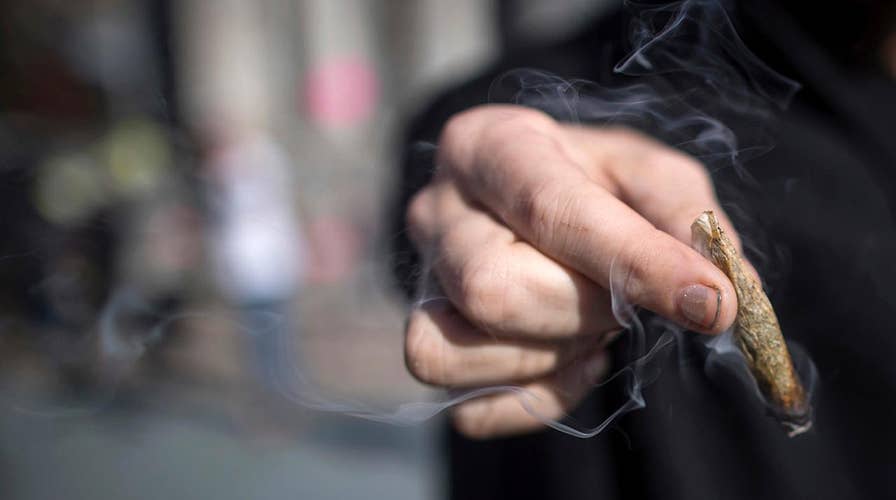Canada legalizes recreational marijuana
Canadians can legally use recreational marijuana, raising new questions about how the policy will affect the U.S.; correspondent Bryan LLenas reports from Montreal.
MONTREAL – Canada became the largest country in the world Wednesday to legalize recreational marijuana nationwide, and there are new questions about the effects this will have on the United States.
On Wednesday afternoon, U.S. Border and Customs Patrol held a press conference in neighboring Michigan, a state that has recreational marijuana on the ballot this November election, warning Americans and Canadians that it is illegal to cross the border with marijuana.
“Marijuana is illegal federally in the U.S., so use of, sales or production, or distribution could render someone admissible to the United States,” said Charles Perry, CBP director of field operations. Perry reiterated that it does not matter if an American is crossing between a state that has legalized recreational marijuana and Canada, like in Vermont, or Washington.
“Federal law supersedes state law,” he said.
CBP is also warning Canadians who work in the legal marijuana industry that they may be denied entry into the United States if they are traveling on a marijuana business trip.
Even those who admit to smoking marijuana in Canada could be deemed inadmissible. It is up to the border agent’s discretion.
As Canada’s grand cannabis experiment begins, Americans in border states will weigh their own future. Michigan and North Dakota have recreational marijuana legalization on the ballot in November. So far, nine states and Washington D.C. have legalized marijuana, including Maine and Vermont. There are varying opinions as to whether Canada’s legalization will positively or negatively affect public opinion in the U.S.
“The ship is already sailing at the velocity it can sail at in the U.S.,” said Richard Hahn, executive director of Crime and Justice Program at New York University. “Canadian legalization will proceed with very little impact on the United States.”
Hahn believes this is partly due to market forces, mainly Americans who don’t need Canadian marijuana because there is plenty of supply in the nine states that have legalized it.
“When you involve crossing an international border with an illicit drug, you are adding tremendously to the risk you are facing,” he explained, pointing out that laws in U.S. states where recreational marijuana is legal are much less restricted than in Canada. “You’re better off sticking with the domestic product.”
Others, however, are sounding the alarm.
On Wednesday, the anti-marijuana advocacy group Smart Approaches to Marijuana, or SAM, launched a watchdog campaign called PotWatch to monitor the legalization policy in Canada.
“This is really the last thing our hemisphere needs right now in the midst of an opiate epidemic is to increase the U.S. of illegal drugs and any drug that’s intoxicating, including marijuana,” Kevin Sabet, President of SAM, told Fox News.
On Wednesday, Canadian Prime Minister Justin Trudeau spoke to parliament, reiterating why he had been campaigning for this legislation over the last few years. Trudeau believes legalizing marijuana will regulate the supply and help to keep marijuana out of the reach of children, and to keep profits away from organized international crimes. The government hopes this legislation will cut the $8 billion black market in half by the end of the first year.
Sabet has his doubts.
“The cartels will always be many steps ahead of the provincial and federal bureaucrats unfortunately, I hate to say it,” Sabet said. “And I think they will be easily able to outsmart our government and have this spread across the continent.”
Meanwhile, on Wednesday there was the smell of marijuana in the streets and the sound of cheers from Canada’s first legal marijuana customers.
Thousands of Canadians lined up in front of over 100 private and government stores Wednesday, including Corey Stone, who arrived just before 4 a.m. at a government store in downtown Montreal.
“I’m very happy that prohibition has ended,” Stone said. “I think this will end the stigma of cannabis a little bit.”
Other customers were hopeful it was the start of a movement that will sweep nations worldwide.
“I think we can be a shining example to our neighbors to the south, there is a very dynamic legalization community down there,” Marc-Boris St. Maurice said.
Only time will tell if Canada’s nationwide legalization will serve as an example or a cautionary tale.
“Look, we did it," St. Maurice said, "and the sky hasn’t fallen and everyone looks like they are having a jolly good time.”








































